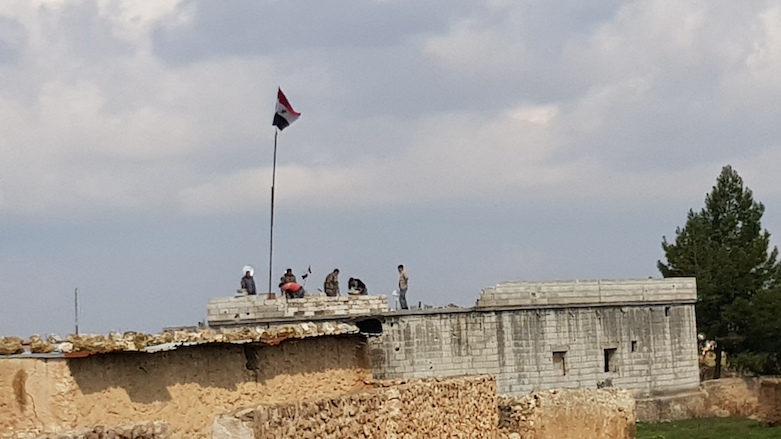Syria's war divides communities in flash point town

ERBIL (Kurdistan 24) – The years-long Syrian civil war has divided communities, who in the past could easily travel from one town to another.
One such example is the town of Arima which is part of the al-Bab district. However, civilians in Arima cannot travel to Bab because it is under Turkish occupation.
For civilians in Arima, who own property and olive fields in Bab, the de-facto division of Syria creates problems. The division has prevented people in Arima from tending to their olive trees which are in areas under Turkish occupation.


The territory in the area is split between US-backed Syrian Democratic Forces (SDF) in Manbij, the Russians and Syrian government forces in Arima, and Turkish-backed forces in al-Bab. Moreover, the Arima civil council falls under the SDF-linked Bab Military Council (BMC).
Abu Ahmed, a 62-year-old who lives in Arima on the border with Turkish-backed forces in Bab, compared the state of affairs to division in Palestine under Yasser Arafat.
“Before, we were one people, but now we are similar to Palestine under Arafat: there are three brothers, with all their own three states,” he said.
“I haven’t seen my daughter for over two years,” Ahmed added. “This war created these borders, but we are one people.”
According to Ahmed, civilians were allowed to harvest their olives last year, but are denied the right to take care of their trees.

US President Donald Trump’s withdrawal announcement in December led to new developments on the ground in Syria. Russian forces, who had left the war-torn country the previous year, returned to Arima in January to prevent a possible Turkish attack on Syrian Kurds in Manbij.
Furthermore, the Russians were eager to move into neighboring Manbij in case America removed its troops, where the US backs the SDF-linked Manbij Military Council. Until now, the US and other coalition partners have kept their forces in northeastern Syria.
Syrian-Russian coordination centre in Arima. This is west of Manbij pic.twitter.com/QaOV7XEFE0
— Wladimir (@vvanwilgenburg) February 27, 2019
There is also a US base a few kilometers outside of Arima, and US patrols to prevent a possible Turkish attack continue in neighboring Manbij.
US base and Russian base not far from eachother pic.twitter.com/u6GjsKjeFK
— Wladimir (@vvanwilgenburg) February 27, 2019
Jamal Abu Juma, the General Commander of the Bab Military Council, said Trump’s withdrawal announcement had put Arima in “the spotlight.”
“It was as if Arima was a huge city like London, Paris, or New York. Even the mercenaries [Turkish-backed groups] started calling Arima little Moscow,” he told Kurdistan 24.

Ali, a 22-year-old local commander on the front line against Turkish-backed forces, suggested tensions increased after America’s statement of a troop withdrawal.
“Before the withdrawal decision there were no tensions, but since the withdrawal decision there are almost daily incidents,” he noted.
Turkish-backed groups have often shot at points belonging to the SDF-linked forces in Arima and Bab. According to Ali, Russian troops now come “to check the situation, after shooting incidents.”
“We, as the Bab Military Council, return fire if attacked,” he added.

Commander Juma also revealed that Turkish forces advanced to the borderline of the east of the Euphrates in late December where they “kept threatening these already stable areas.”
“They want to attack us because they don’t want us legitimate forces to exercise our right to reclaim Bab city from the occupation,” he said.
Turkish-backed forces seized Bab in February 2017.
“There is no rule of law or safety there [in Bab],” Juma continued. “They steal, kidnap, and kill each other. Life is terrible over there.”
“Two days ago, there was a fight in Bab between the al-Hamza brigade and Ahrar al-Sham. Some civilians were killed in the internal fighting.”
The SDF-backed fighters claim Turkish-backed forces are brought from other provinces such as Eastern Ghouta, Homs, and other areas to fight against them instead of the regime.
Therefore, fighters from the Bab Military Council believe the US should stay in the area to prevent a war between Turkish-backed forces and the SDF.
“If the US-led coalition keeps its forces it will provide more stability and security in the region,” Yusuf Arima, a commander in the Kawkli village, said.
However, until a political solution is found, it appears Syria will continue to remain divided under different factions backed by different countries.
Editing by Karzan Sulaivany
